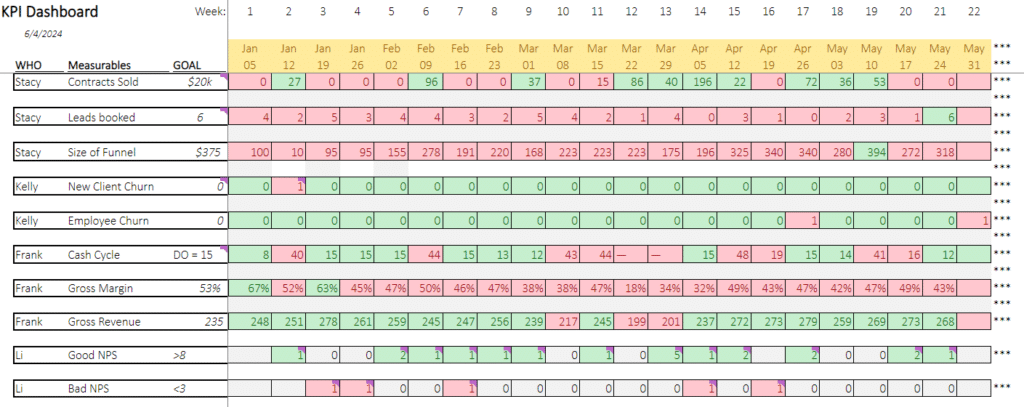In the bustling world of small business, the mention of Key Performance Indicators (KPIs) often evokes mixed feelings. For the successful entrepreneur who built their business through passion and rich relationships, diving into the numerical abyss can seem cold or outright alienating. However, embracing small business KPIs is not a departure from your valued team culture. On the contrary, KPI’s reinforce your culture by providing a clear, concise glance at your business’s health, empowering you to steer efforts toward meaningful initiatives.
What are KPIs?
KPIs are quantifiable measures used to evaluate the success of an organization, employee, or specific activity in meeting objectives for performance. They serve as a compass, guiding your business toward its strategic goals.
Good small business KPIs share certain characteristics. They are:
- Relevant
- Timely
- Measurable
- Clear
- Actionable

The Dangers of KPIs
The strength and weakness of KPIs is their simplicity: as a one-dimensional number, they provide no depth or details. A KPI is merely a signal suggesting further investigation, not a cue to react harshly.
Those who fail to appreciate the nuance of KPIs come off as cold, short-sighted managers who focus more on numbers than results.
Keep in mind that small business KPIs are especially susceptible to data quality issues since they lack dedicated decision support and IT teams.
As a result, your response to an unfavorable metric should be engaging the team in a healthy conversation. Work together to determine what went wrong, or why the desired goal wasn’t reached, and agree on a corrective strategy for future success.
How KPIs Help Businesses
Imagine two management teams at the helm of similar retail businesses with different small business strategies. Let’s take a look at how each team might approach a similar situation.
Team Intuition
Focused entirely on the customer as a person, this team believes no metric can accurately capture the essence of their business. This customer-centric small business strategy grew the business to $10M in revenue without degrading people by “managing to the numbers.”
But sometime in Q2 they notice that cash is shrinking and revenues are dropping. After lots of arguments about the root cause, the owner concludes customer loyalty has dropped and is moving to the competition.
Short on cash, they desperately implement discount strategies and customer outreach programs hoping to reverse the trend. The atmosphere becomes tense, with every team member feeling the pressure to perform miracles.
Team KPI
The competitor across town has a weekly ritual that some might find tedious: they review their KPIs at the start of each team meeting. Small business performance metrics seem mundane, and attendees often wonder why bother since they hardly do anything with the metrics. The team often jokes about the uselessness of the metrics.
But back in Q1, they spot a downturn in customer retention early on. With time on their side, the team collaborated to form a strategic response:
- Analyze customer feedback,
- Adjust their service quality, and
- Introduce loyalty programs.
Team KPI addressed the issue before it became a crisis. Although the situation was challenging, the team felt empowered, united, and strong in their proactive stance.
This contrast highlights how KPI benchmarking can be used to not only avert crises but also to foster a sense of achievement and collaboration among team members. KPIs, far from being a cold set of numbers, can become a source of team pride and motivation.
How to develop KPIs
KPI development should be a collaborative process with your management team. To learn more, check out our article on choosing the right KPIs.
KPIs Reinforce your Core Values
Incorporating small business KPIs doesn’t have to be a departure from your team culture. On the contrary, it’s an enhancement, providing a clear framework within which creativity and intuition can flourish more effectively. By demystifying KPIs and integrating them into your regular operations, you can ensure that your team not only survives but thrives, backed by a deeper understanding of your business dynamics. Remember, KPIs are not just numbers; they’re the story of where you are, where you’re going, and how united your team is in that journey.
Looking for help developing your Key Performance Indicators (KPIs)? Schedule a consultation with our financial experts for an individualized approach.
This article was written by a CFOshare employee with assistance from generative AI for rhetoric, grammar, and editing. The ideas presented are a combination of the author’s expertise, original ideas, and industry best practices.



